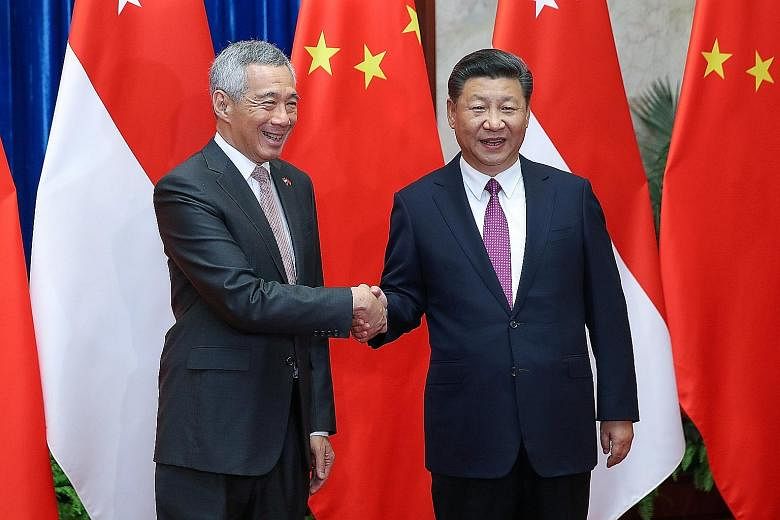When world leaders gathered in Beijing in May for the inaugural Belt and Road Forum presided over by Chinese President Xi Jinping, Prime Minister Lee Hsien Loong was noticeably absent.
He was one of three Asean leaders who were not invited - the other two were Thailand and Brunei's leaders - an unexpected development which some observers viewed as China indicating its displeasure with Singapore.
The episode was one of several turns this year in the relationship between the two countries. Ties have since warmed up, especially after PM Lee visited Beijing on the eve of the Chinese Communist Party's 19th national congress in September.
But the year began with the relationship in a cool state, with nine of Singapore's military infantry carriers still detained by Hong Kong Customs. The Terrex vehicles were impounded on Nov 23 last year on their way back here after a military exercise in Taiwan. Following the seizure, Beijing called on Singapore to adhere to the "One China" policy, reiterating its opposition to Singapore's military ties with Taiwan.
In late January, the vehicles were released, and Deputy Prime Minister Teo Chee Hean visited Beijing a month later for a high-level bilateral meeting. Chinese media hailed Sino-Singapore ties as being on the mend.
Then came what many saw as the Belt and Road Forum snub in May.
Veteran China watcher Wang Gungwu pointed to four events that affected China's relations with Singapore in 2016 and 2017.
Two had a direct impact, he said. The first was when the independence-leaning Democratic Progressive Party led by Ms Tsai Ing-Wen assumed power in Taiwan last May. Cross-strait ties chilled after her election victory, and China moved to ramp up diplomatic pressure on Taiwan's allies to sever ties with it.
The second was an international tribunal ruling against China's territorial claims in the South China Sea last July. Singapore later said it supported the peaceful resolution of disputes in accordance with the principles of international law.
The other two, Professor Wang said, were surprises that rocked the Anglo-American order that has supported Singapore since its independence - the Brexit referendum and the surprise election of Mr Donald Trump as US President.
"Each contributed cumulatively to the pressure for change in the region, not least to South-east Asia in which Singapore's role is seen as pivotal," said Prof Wang, who is chairman of the ISEAS - Yusof Ishak Institute and National University of Singapore's East Asian Institute. "That these events should affect Singapore-China relations is not unexpected and both countries sought to make adjustments as they saw fit," he added.
As Singapore's ties with China came under the spotlight, the Republic's foreign policy - usually conducted in a low-key manner - also sparked a rare public debate in July, after Lee Kuan Yew School of Public Policy (LKYSPP) dean Kishore Mahbubani opined in this newspaper that an eternal rule of geopolitics is that "small states must always behave like small states". Professor Mahbubani also urged discretion and restraint in commenting on matters involving great powers.
His column drew swift rebuttals from Singapore's foreign policy intelligentsia - Law and Home Affairs Minister K. Shanmugam found it "questionable intellectually", while veteran diplomat Bilahari Kausikan described it as "muddled, mendacious and indeed dangerous".
A month later, the Government announced it would expel LKYSPP academic and US citizen Huang Jing for working with a foreign government to influence Singapore's foreign policy and public opinion here.
It did not name the foreign government that Dr Huang, who was born in China, worked for. The case, the first of its kind in nearly two decades, was also unexpected as Singapore moved to send a strong signal against foreign influence.
Ties with China improved in September, after PM Lee's visit to Beijing where he met President Xi and three other members of the apex Politburo Standing Committee.
Said Prof Wang: "The fact that the relationship stabilised within months is evidence that it has strong foundations and that both sets of leaders are sensitive to the testing challenges ahead and have been quick to reaffirm their common interests."
NUS political scientist Chong Ja Ian said one possible message that Beijing may also be sending in its treatment of not just Singapore but also other key regional actors - especially those with strong ties with the US - is that their relations with Beijing and perhaps economic future depend on the pleasure of China.
"If China wants good relations, then relations will be good; if Beijing decides otherwise, everything could be held in jeopardy," he said.
He reckons Singapore's relations with China are now on an even keel, but noted this can turn very quickly.
As Singapore assumes chairmanship of Asean next year, China would likely want to work with the Republic to ensure there is a positive outlook on its relations with the regional bloc, said Dr Chong.
He added: "Asean can make demonstrations of unity, good neighbourliness, and positive relations with China easily. Whether Asean is able to make substantive progress on issues where differences exist with China may be another matter."


